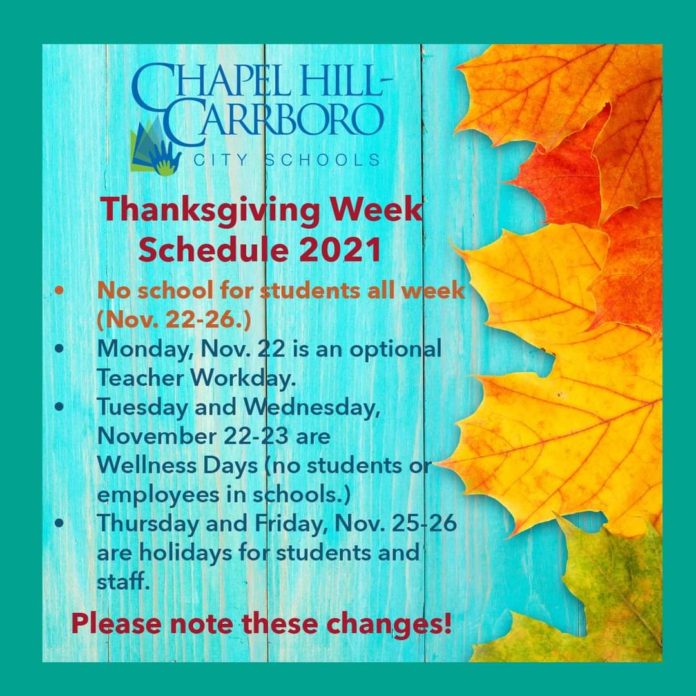
As students readjust to in-person learning, the Chapel Hill-Carrboro City Schools (CHCCS) district has prioritized emotional well-being by allocating “mental health days” to the academic calendar.
The school board, at its October 21 meeting, voted to give students and staff the week of Thanksgiving off, a decision that sprouted from recent emphasis on the importance of students’ mental health from parents, faculty and students themselves.
Monday, November 22, and Tuesday, November 23, were originally full school days, while Wednesday, November 24 was a scheduled teacher workday.
Social studies teacher Aaron Wark sees benefit in the “wellness days” being provided to students and faculty before Thanksgiving.
“As a teacher, those two days are not usually the most productive and academically rigorous experiences,” he said. “They are very much ‘teachers going to play a movie’ kinds of days because plenty of students are already absent.”
Over 20 school districts have followed suit and granted teachers and students the week of Thanksgiving off, according to a recent story in CNN.
Teachers at Chapel Hill High School were instructed not to give students academic work over Thanksgiving week, as well as winter break.
“I think that [mental health days] will be beneficial for everyone if we’re intentional about how we utilize that time. Those days off are not going to be beneficial to students if they have classes where teachers have assigned extensive projects,” Charlos Banks, the district’s Chief of School Support and Wellness, said.
Banks’s position underwent a name change this year, changing from Senior Executive Director of Student Services to Chief of School Support and Wellness under Nyah Hamlett’s leadership as the new district superintendent.
District leadership has also instituted other changes with students’ mental health in mind.
Following Thanksgiving break, the school will return to a normal lunch schedule, allowing seniors to leave campus and underclass students to take advantage of a full 40-minute lunch break.
The change in the lunch schedule will “provide additional opportunities to increase socialization and connectivity for all students during their lunch periods,” according to an email written by Hamlett.
“I like [longer lunches]. I can see more friends who are in later groups now,” freshman Gideon Jones said.
Effective January, the district will also implement “Mindful Mondays” and “Wellness Wednesdays,” featuring “relaxed schedules” intended to reduce stress and anxiety among students.
Monday, February 14, originally a school day, will now be designated a “Mindful Monday.”
Students largely seem in favor of the mental health days the district added to the calendar.
“I think it’s a really good idea to give students some time to recharge. I think [these days] will be beneficial for my mental health,” junior Wes Heitz said.
Senior Min Thu added, “I appreciate them. It’s important to have a break from thing and to take it slow and be able to find yourself.”
The district has made Social-Emotional Learning (SEL), a methodology used in teaching that encourages students to address their emotions, an important component of instruction since the pandemic began.
“Teachers are encouraged by not only our building-level administrative team, but also by the district to start putting in and continue to do more and more SEL check-ins and best practices,” Erich Priest, the school’s Mental Health Specialist, said. “[We encourage] trying to let students know that this is a safe place to talk about what’s going on.”
Educators say SEL instruction is important given the learning loss—academically, socially and emotionally—that many students have experienced.
“[Students] know what’s appropriate and what’s inappropriate, but that line was so blurred during the pandemic while at home that some students just forgot,” guidance counselor Imani Agee said.
Junior Ryan Kilgallen is one of several students who said that remote learning made it difficult to form connections with his peers.
“I would definitely agree that [being at home] made it tougher to interact with others, simply because of the distance,” he said.
Even though the worst of the pandemic seems behind us, educators recognize that it is imperative to monitor students’ emotional well-being.
“I think it’s great overall that we’re back in-person. I don’t want to dismiss any sort of worry or anxiety that [being in-person] also brings, though,” Priest said.











